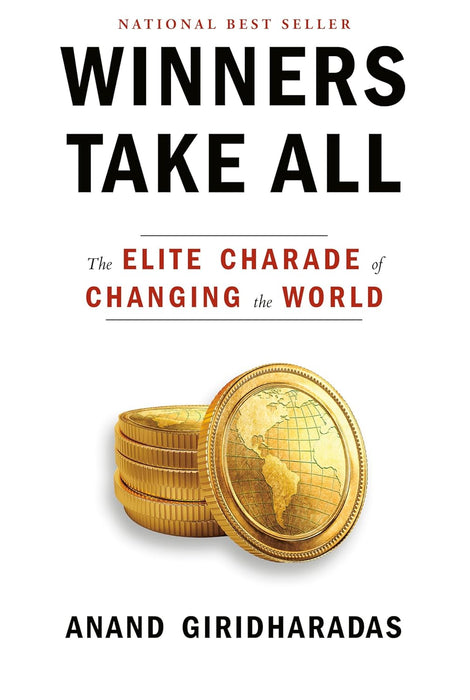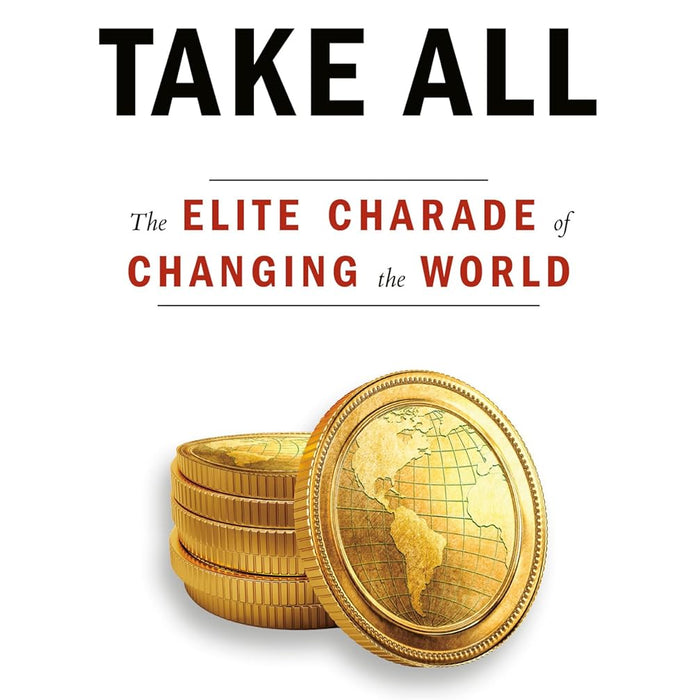Winners Take All By Anand Giridhdardas
- Publisher: POLITICAL SCIENCE
- Availability: In Stock
- SKU: 42004
- Number of Pages: 288
Rs.240.00
Rs.300.00
Tags: "win-win" rhetoric , anecdotes , benevolence , best books online , Best Price , Best Selling Books , billionaires , Book Shop , business acumen , case studies , Convenient Shopping , corporate influence , corporate power , corporate responsibility , economic inequality , economic justice , economic progress. , economic reform , economic systems critique , elite , elite influence , entrenched interests , ethical capitalism , ethical leadership , financial power , global economy , global elite , global inequality , government intervention , incremental change , independent journalism , Inequality , intellectuals , Internet Shop , legitimacy , market dominance , market mechanisms , market solutions , market-based solutions , market-driven change , MarketWorld , narrative control , Online Book Shop , ONLINE BOOKS , Online Books Shop , Online Bookshop , online bookstore , philanthrocapitalism , philanthropy , policy advocacy , power imbalance , power structures , private sector solutions , privilege , profit motive , public good , public interest , public trust , radical change , reform , self-serving , social entrepreneur , social equity , social impact , social innovation. , social justice , social problems , societal impact , societal inequality , societal progress , status quo , structural change , structural inequality , systemic change , systemic inequality , technocracy , technocratic solutions , technological solutions , trade-offs , transformative approaches , wealth accumulation , wealth concentration , wealth disparity , wealth redistribution
"Winners Take All" by Anand Giridharadas is a critical examination of how the global elite, under the guise of philanthropy and social responsibility, perpetuate systemic inequality while preserving their own power and wealth. Giridharadas argues that the efforts of the wealthy to address social issues are often superficial and self-serving, ultimately maintaining the status quo rather than challenging the structures that produce inequality. Through detailed analysis and compelling anecdotes, the book exposes the contradictions and limitations of so-called "win-win" solutions advocated by the privileged class.
Key Points
1. The Elite's Control Over Change
Giridharadas highlights how the elite maintain control over social change, ensuring that any progress benefits them without threatening their dominance. They set the agenda and dictate the terms of the debate, often focusing on solutions that do not challenge the underlying power structures.
2. MarketWorld Ideology
The book introduces the concept of "MarketWorld," a belief system that promotes market-based solutions to social problems. This ideology suggests that business acumen and market mechanisms are the best ways to address societal issues, sidelining more transformative approaches that might involve government intervention or structural changes.
3. Philanthropy and Power
Giridharadas critiques the role of philanthropy in maintaining inequality. He argues that philanthropic efforts by the rich often serve to enhance their influence and legitimacy while failing to address the root causes of social problems. This philanthropy acts as a "safety valve" that prevents more radical change.
4. The Myth of the Social Entrepreneur
The book challenges the glorification of social entrepreneurs, individuals who are celebrated for their innovative approaches to solving social problems. Giridharadas points out that these entrepreneurs often work within the existing system, making incremental changes rather than addressing deeper issues of power and inequality.
5. Critique of "Win-Win" Solutions
Giridharadas is skeptical of the "win-win" rhetoric that claims social and economic progress can be achieved without any sacrifices from the powerful. He argues that true social change often requires significant trade-offs and confrontations with entrenched interests.
6. The Role of Media and Intellectuals
The media and intellectuals often play a role in perpetuating the myths of MarketWorld by promoting narratives that favor the elite. Giridharadas calls for a more critical and independent approach to journalism and scholarship that questions the assumptions and interests of the powerful.
7. Case Studies and Anecdotes
The book includes numerous case studies and anecdotes to illustrate its arguments. These real-life examples provide a compelling and concrete basis for Giridharadas' critique, showing how the principles he discusses play out in practice.
8. The Limitations of Technological Solutions
Giridharadas addresses the limitations of relying on technology to solve social problems. He argues that technological solutions often fail to address underlying issues of power and inequality and can sometimes exacerbate these problems.
9. The Ethics of Wealth Accumulation
The book questions the ethics of accumulating vast wealth in a world with significant inequality. Giridharadas suggests that the wealthy have a responsibility to address the systemic issues that allow such disparities to exist.
10. Call for Structural Change
Ultimately, Giridharadas calls for more radical structural changes to address inequality. He advocates for policies and approaches that challenge the power of the elite and create more equitable systems, rather than relying on the goodwill of the wealthy.
In conclusion, "Winners Take All" by Anand Giridharadas offers a thought-provoking critique of the ways in which the global elite maintain their power under the guise of benevolence. The book urges readers to question the narratives and solutions promoted by the powerful and to consider more transformative approaches to achieving social justice.
════ ⋆★⋆ ═══
Writer ✤ Anand Giridhdardas

























